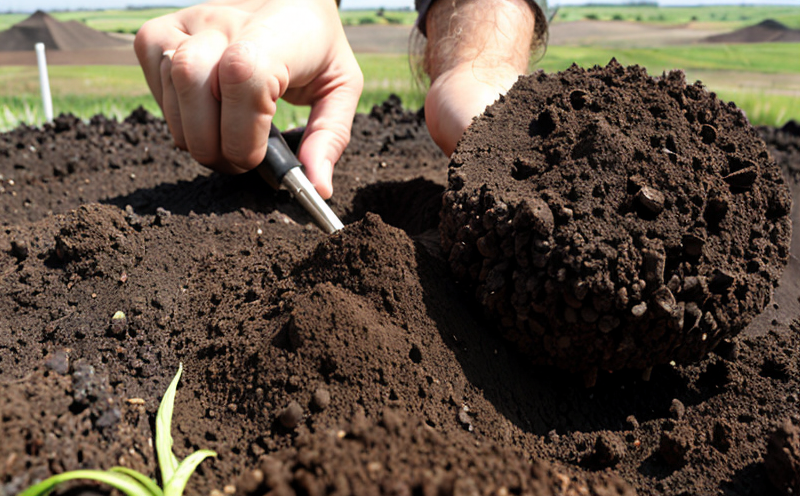Organic Matter & Carbon Content Testing
The testing of organic matter and carbon content in water and wastewater is a critical component of environmental monitoring and compliance. This service ensures that the quality of water meets regulatory standards, supports sustainable practices, and protects public health.
Water bodies, whether natural or man-made, can accumulate various forms of organic matter such as dissolved organic compounds (DOC), humic substances, and other biodegradable materials. These contaminants can impact water clarity, taste, odor, and overall quality. Monitoring carbon content is essential for understanding the biodegradability and potential ecological impacts of these substances.
Carbon content in water is typically measured using standardized methods such as loss on ignition (LOI) or total organic carbon (TOC). These tests provide insights into the presence of organic matter, which can be a significant factor in determining treatment efficiency and environmental impact. The ability to quantify these parameters accurately allows for informed decision-making in wastewater management.
Organic matter testing is particularly important in sectors such as municipal water supply, industrial discharge monitoring, and agricultural runoff assessment. It helps stakeholders ensure that their operations comply with local and international regulations. For instance, the U.S. Environmental Protection Agency (EPA) and other global bodies provide guidelines for acceptable limits of organic matter and carbon content.
The methodology involves collecting water samples from various points in a wastewater treatment process or directly from sources like rivers and lakes. These samples are then prepared according to specific protocols, often involving filtration and dilution steps to ensure accuracy. The prepared samples undergo rigorous analysis using advanced instrumentation such as TOC analyzers and thermal gravimetric analyzers.
Understanding the organic matter content is crucial for optimizing wastewater treatment processes. For example, knowing the total carbon content helps in assessing the effectiveness of biological nutrient removal (BNR) systems. This information can guide adjustments to operational parameters like aeration rates or sludge retention times. Proper management of organic matter also reduces the likelihood of microbial imbalances that could lead to harmful algal blooms.
Moreover, accurate carbon content data is vital for assessing the environmental impact of industrial discharges and agricultural activities. It helps in identifying potential hotspots where excessive organic loading might stress aquatic ecosystems. By detecting such issues early, stakeholders can implement corrective measures to prevent broader ecological damage.
In summary, organic matter and carbon content testing plays a pivotal role in maintaining water quality standards, ensuring compliance with environmental regulations, and supporting sustainable practices across various industries. This service is essential for quality managers, compliance officers, R&D engineers, and procurement teams who need reliable data to make informed decisions.
Scope and Methodology
The scope of organic matter and carbon content testing includes the identification and quantification of various forms of organic compounds present in water samples. This service focuses on parameters such as total organic carbon (TOC), dissolved organic carbon (DOC), and particulate organic carbon (POC). The methodology involves several key steps:
- Sample Collection: Samples are collected from specific points in wastewater treatment plants or directly from water sources. Care is taken to ensure that samples represent the entire process or source.
- Preparation: Samples may undergo filtration and dilution steps to standardize them for analysis. This step ensures accurate measurement of carbon content without interference from other factors.
- Analysis: The prepared samples are analyzed using advanced instrumentation such as TOC analyzers, infrared spectrometers, and thermal gravimetric analyzers. These tools provide precise readings of the organic matter present.
- Reporting: Results are compiled into comprehensive reports that include detailed analyses, interpretations, and recommendations for further action if necessary.
The testing process adheres to international standards such as ISO 15706:2013 for TOC determination and ASTM D4840-19 for DOC measurement. These standards ensure that the results are accurate, reliable, and comparable across different laboratories.
Eurolab Advantages
Eurolab stands out in organic matter and carbon content testing through its stringent quality control processes and state-of-the-art laboratory facilities. Our team of experts ensures that every sample is handled with precision, from collection to final analysis.
- Accurate Results: Using cutting-edge instrumentation, Eurolab guarantees precise measurements of organic matter and carbon content in water samples.
- Compliance Assurance: Our services are tailored to meet the specific requirements of local and international regulations. This ensures that clients remain compliant with all relevant standards.
- Expertise and Experience: With years of experience, Eurolab’s team comprises highly skilled professionals who understand the nuances of water quality testing.
- Rapid Turnaround Times: Efficient processes allow us to deliver results quickly without compromising on accuracy. This is crucial for timely decision-making.
- Customized Solutions: We offer tailored solutions that address the unique challenges faced by different sectors, ensuring that each client receives a service that meets their specific needs.
Eurolab’s commitment to excellence and innovation has earned us a reputation as a leading provider of water quality testing services. Our clients benefit from our comprehensive approach, which combines technical expertise with practical insights.
Competitive Advantage and Market Impact
- Comprehensive Service Offerings: Eurolab provides a full range of water quality testing services beyond just organic matter and carbon content. This comprehensive approach ensures that clients receive integrated, holistic support.
- Advanced Instrumentation: Our state-of-the-art instrumentation allows for highly accurate and precise measurements, giving us a competitive edge in providing reliable results.
- Regulatory Compliance: By ensuring strict adherence to international standards such as ISO 15706:2013 and ASTM D4840-19, Eurolab helps clients stay ahead of regulatory changes and requirements.
- Innovation and Research: Our commitment to research and development enables us to stay at the forefront of water quality testing technology. This innovation translates into more accurate and efficient testing methods for our clients.
These advantages position Eurolab as a leader in the market, offering unparalleled services that contribute significantly to environmental protection and compliance.





